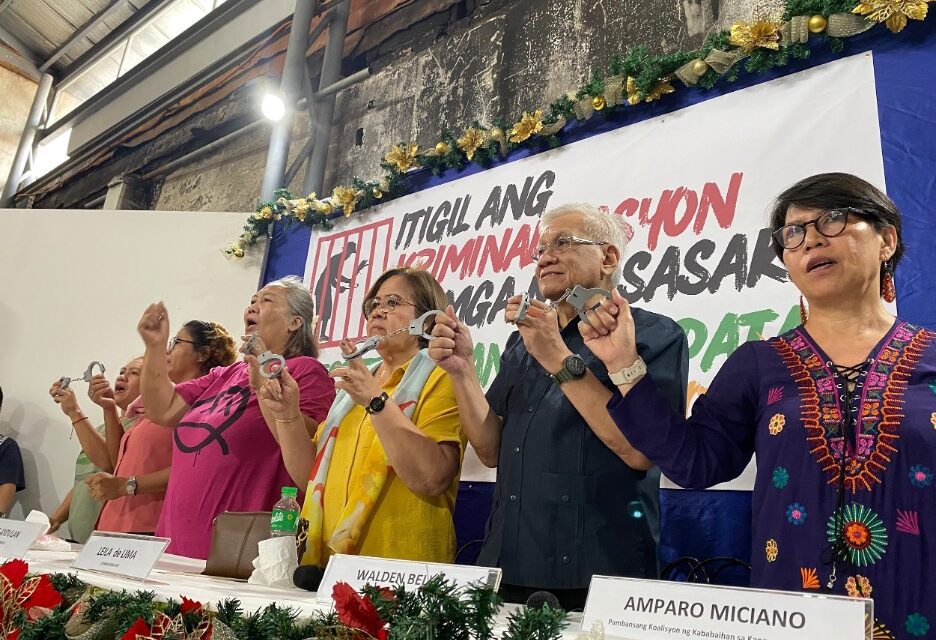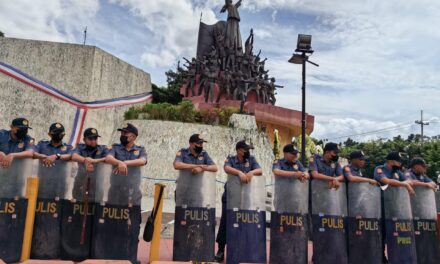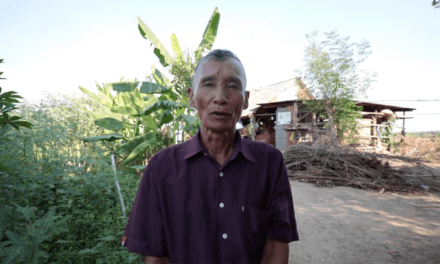Fe Andulan, one of the accused says, “Nag desisyon kaming ipresenta ang aming mga sarili kay Senadora Leila De Lima, kapwa biktima ng gawa-gawang kaso, upang igiit na wala kaming ginawang labag sa batas, at ang mga kaso laban sa amin ay naglalayon lamang pigilan ang aming pakikibaka para sa aming lupa”. (We have decided to present ourselves before Senator Leila de Lima, a fellow victim of trumped up charges, in order to assert that we have not done anything illegal, and that these cases against us are simply meant to derail our struggle for our land.)
The embattled farmers—some of whom are already senior citizens with health issues—face multiple counts of syndicated estafa filed against them before the regional trial court in Bataan. The charges stem from supposed illegal collection of membership fees or butaw over many years, amounting to P148,000, among the members of the farmers organization SANAMABASU. Syndicated estafa is a non-bailable criminal offense, punishable with imprisonment from 12 up to 20 years.
Despite a favorable decision issued by the DOJ in 2023 on the petition for review filed by the accused, the cases proceeded in court. In May 2023, two out of the nine accused farmers presented themselves before the National Bureau of Investigation (NBI) and were detained at the Bureau of Jail Management and Penology (BJMP) in Orani, Bataan. The RTC allowed for a P200,000 bail for each count two months later. The court finally dismissed the cases against the two “on the ground of insufficiency of evidence.”
With the surrender of six farmers in Hermosa, Bataan today, the farmers have filed motions before the court to reduce the bail for the remaining accused, and to dismiss the charges altogether.
Former Senator and human rights advocate De Lima, who herself suffered detention because of false and malicious charges amounting to political prosecution, expressed her support for the cause of the criminalized farmers:
“Nakikiisa ako sa mga magsasaka ng Sumalo na nahaharap sa mga gawa gawang kaso. Ang mga kaso laban sa inyo ay pawang mga harassment suits para pahinain ang inyong boses at and pag laban ninyo para sa Lupa. (I am one with the farmers from Sumalo who are now facing these trumped up charges. The cases against you are pure harassment suits intended to weaken your voices and your struggle for land.”
“Nandito din ako para magbigay ng mensahe ng pagasa. Pagkatapos nitong press conference ay pupunta na kayo sa Bataan para i-surrender ang inyong sarili. Huwag po kayo mawawalan ng pag-asa. Gaya niyo, humarap din ako sa gawa-gawang mga kaso. Halos pitong taon akong nakakulong, mabagal ang takbo ng kaso, hanggang sa na-dismiss na ang kaso ngayong taon.” (I am here as well to deliver a message of hope. After this press conference, you will go to Bataan to present yourselves before the authorities. Do not lose hope. Like you, I was also a victim of false charges. I was incarcerated for almost seven years, and had to endure a very slow legal process until the cases filed against me were eventually dismissed just this year.)
Nakakagalit na marinig ang inyong mga kwento. Hindi katanggap-tanggap ang kriminalisasyon. Ang paggamit sa batas para mang harass at manggipit. Ang weaponization of law. Kasama nyo po ako sa laban nyo.” (Hearing your stories angers me. Criminalization is unacceptable. The use of the law to harass and pressure. This constitutes the weaponization of laws.”
Elijah San Fernando of the National Federation of Labor also expressed support for the farmers. He clarified how their situation forced them to evacuate from Sumalo to protect their life and liberty: “Lahat naging laban sa kanila. Kahit yung local government—mayor mismo na dapat poproteksyunan ang kanilang nasasakupan. Anong ginawa ng mayor sa kanila? Sa halip na proteksyunan ang kanilang karapatan, sa halip na bigyan sila ng kanlungan, sila pa mismo ang nagpalayas. Kaya masisisi ba natin ang mga magsasaka na sila ay tatakbo at lalayas mula sa kanilang tinitirhan? Ginigipit ng pulis, ginigipit ng militar, ginigipit ng local na gobyerno. Kahit sino sa atin ang maharap sa ganyang sitwasyon, ganyan din ang gagawin.” (Everyone was against them. Even the local government—the mayor himself who is mandated to protect his constituents. What did he do to them? Instead of protecting their rights, instead of providing shelter, his government even evicted them. So can we blame the farmers if they chose to run away from their hometown? They were being suppressed by the police, the military, and the local government. Anyone of us who faces that situation would probably have done the same.)
The Sumalo farmers’ case is but one of a rising number of criminal cases thrown against land, indigenous and environmental rights defenders. This alarming trend constitutes what law experts have referred to as strategic lawsuits against public participation or SLAPP, which are meant to harass, vex, exert undue pressure or stifle enforcement of laws or assertion of people’s rights.
The widespread criminalization of land, indigenous, and environmental defenders such as the Sumalo farmers is happening alongside the prevalence of conversion of farmlands. The multifaceted attacks against small-scale food providers and rights defenders are happening against the backdrop of an intensifying food crisis, amid which the Philippines has continued to be the world’s top rice importer.
Owing to the severity of the human rights crisis in Sumalo, the struggle of the Sumalo farmers has also reached the international level. Their case was included in a report on the criminalization of peasants and land rights movements in the Philippines submitted to the United Nations Special Procedures mandate holders: Mary Lawlor, Special Rapporteur on the situation of human rights defenders, Olivier De Schutter, Special Rapporteur on extreme poverty and human rights , and Tlaleng Mofokeng, Special Rapporteur on the right of everyone to the enjoyment of the highest attainable standard of physical and mental health.
The Sumalo case was also cited in a recent submission to the Working Group on the UN Declaration on the Rights of Peasants (UNDROP).
In the last decade, the farmers of Sanamabasu have faced more than fifty criminal, administrative and civil cases filed against local leaders who are asserting land/tillage claims in an Agrarian case that reached the Supreme Court. Such cases include ejectment, grave coercion and cyberlibel.
On the syndicated estafa case, Andulan, one of the accused farmers, laments, “Dahil sa dami ng kasong isinampa sa amin nitong nakalipas na dekada—kasama pa ang mga gastusin para sa paghain ng petisyon kaugnay ng aming lupang sakahan—ay kinailangan namin makalikom ng pondo para sa mga abugado. Pero ginamit pa itong dahilan para ipakulong at patahimikin kami.” (The sheer number of cases filed against us over the last decade—including the cost of filing our agrarian petition—compelled us to raise organizational funds to cover legal fees. But they even used it as a pretext to detain and silence us.)
Former Congressman Walden Bello also expressed his solidarity with the Sumalo farmers. “We’re asking Sec Remulla to dismiss these types of harassment cases. Alam ni Sec Remulla na gawa gawang kaso ang mga ganito laban sa mga magsasaka. Gaya ng kaso laban sa akin, ang mga ganitong kaso ay may layunin na pahirapan kayo, ubusin ang inyong panahon at resources. (Sec. Remulla knows that cases like these against farmers are without basis. And that they are simply meant to burden the accused, waste their time and deplete their resources.”
With their plan to present themselves to authorities and face the charges against them, the farmers and various support groups are confident that the court will finally dismiss these frivolous and malicious charges so that the farmers can regain their liberty, continue to assert their rights, and advance their agrarian struggles.
“Mataas po ang tiwala namin na mapapawalang bisa ang gawa gawang kasong ito. Nagpapasalamat kami kay Judge sa naunang desisyon na ma-dismiss ang kaso laban sa akin at isa pang kasama. Kumpiyansa kami na sa dulo ng prosesong ito ay makakamit namin ang kalayaan at hustisyang inaasam,” said Lorna Favorito, one of the farmers accused of syndicated estafa who went through trial that resulted in the dismissal of her case. (We trust that these cases will be dismissed. We thank the Judge for dismissing the cases against me and my fellow accused. We are confident that in the end, all those accused will regain their freedom and the Justice we deserve.)
Favorito added, “Marami na ding mga gawa gawang kaso ang napa walang bisa ng korte. Patunay ito na walang basehan ang mga akusasyon at dapat sana ay ibinasura na sa antas palang ng piskal alingsunod sa mga kautusan ng DOJ. Malaki ang pananagutan ng DOJ, sa pagsagka sa patuloy na kriminalisasyong kinakaharap ng mga magsasaka.” (A number of similar cases of criminalization against us have already been dismissed by the courts. This shows the baseless nature of these charges, which should have already been dismissed at the prosecutor’s level according to the DOJ circular. The DOJ has an obligation to curtail these actions that criminalize the land struggle of farmers.)





![[IN PHOTOS] In Defense of Human Rights and Dignity Movement (iDEFEND) Mobilization on the fourth State of the Nation Address (SONA) of Ferdinand Marcos, Jr.](https://focusweb.org/wp-content/uploads/2025/07/1-150x150.jpg)



